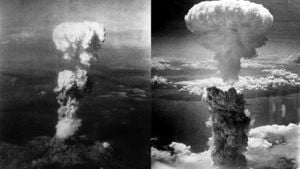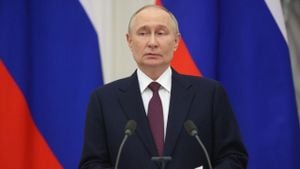Global geopolitics is undergoing significant transformation, with the conflict between Russia and Ukraine standing at the heart of this reshaping process. The war, which has not only involved military tactics but has also sparked extensive discussions around global democracy, authoritarianism, and international alliances, has far-reaching consequences beyond the battlefield.
At the recent Paris Peace Forum, Ukrainian human rights activist and Nobel Peace Prize winner Oleksandra Matviichuk highlighted this broader struggle by stating, "Ukraine is confronting not just Russia but an entire authoritarian bloc, including Iran, China, North Korea, and Syria." Ukraine's fight is often viewed through the lens of regional stability; Matviichuk stresses it’s about more than just borders—it's about the very values underpinning global democratic systems.
Matviichuk pointedly noted, "Ukraine is not a goal. Ukraine is a tool to break international order," signifying the conflict as being part of larger international dynamics and indicating how pivotal Ukraine is to the defense of democratic ideals across the globe.
The urgency of this situation has become even more pronounced as political landscapes shift, especially with the looming possibility of Donald Trump’s re-election to the presidency. Matviichuk expressed her uncertainty about future U.S. support, commenting, "We don't know what will be the policy of the next administration, but what we know for sure is Ukrainians will continue our fight for freedom. We have no other choice." This sentiment reflects the precarious balance of support Ukraine must navigate amid global political changes.
Meanwhile, the economic ramifications of the war are coming to the forefront. Ukraine's economy has been particularly vulnerable, with predictions stating it will only reach 78% of its pre-war size by the end of the year. The government is now focusing on creating more self-sufficient economic strategies to weather the storm of war. Ukrainian First Deputy Prime Minister Yulia Svyrydenko noted the government’s strategy is to develop value-added production within the country. According to her, this approach aims to support local industries and empower businesses to be more resilient against outside influences.
Yet, the economic outlook remains bleak, with growth anticipated to slow to just 2.7% by 2025. This paints a stark picture of the long-term challenges facing Ukraine as it attempts to recover from the devastation of conflict.
On the international front, the war has catalyzed a reevaluation of alliances and economic strategies on a global scale. French economist Marc Uzan, executive director and founder of the Reinventing Bretton Woods Committee, cited the need for systemic reform within the global financial architecture. Uzan remarked, "With the U.S.-led financial consensus at a crossroads, China can play a role in this systemic reform." He elaborated on how previous structures, established during the Bretton Woods Conference, are no longer adequate for addressing today’s challenges of globalization and economic fragmentation.
The evolution of the global order is not limited to European theaters of conflict; it encompasses broader economic trends, where countries like China are increasingly seen as key players. Uzan reflected on the tensions between rising powers and established economic leaders, arguing for revised frameworks to accommodate the growing influence of nations like China, especially as they advocate for reforms within institutions such as the International Monetary Fund. This sentiment resonates widely, echoing the call for greater inclusiveness and representation of all nations within the international economic system.
The backdrop of these conversations indicates increasing concern about global economic stability. The changing nature of geopolitics, with multiple countries asserting their interests and influence, presents both challenges and opportunities. Countries are rethinking their strategies on trade, diplomacy, and even defense as they grapple with the consequences of this reshaped global order.
Concurrently, U.S. efforts to bolster NATO cooperation underline the strategic importance of maintaining solidarity amid rising threats. Recent meetings held by U.S. Secretary of State Antony Blinken with NATO leaders have focused on ensuring continued support for Ukraine, particularly at this pivotal moment before potential shifts with the incoming administration. These discussions highlight the realities facing global security and the need for cohesive strategies against authoritarian movements.
Ukraine stands at the crossroads of these developments, embodying the struggle between democratic values and authoritarian pressures. The nation’s resilience amid conflict remains inspiring. Leaders like Matviichuk embody the spirit of defiance, stating their commitment to fighting for freedom relentlessly. Such actions resonate globally, prompting support from nations recognizing the intrinsic value of democracy.
The path forward remains uncertain. The intersection of the Russia-Ukraine conflict with global economic pressures and geopolitical changes will continue to shape international relations. Leaders must navigate these shifting sands carefully as they prepare for the realities of this new world order.
Negotiations and coalition-building efforts are imperative to uphold the values of democracy. It will require collective action and commitment from nations willing to defend the principles of human rights and freedom. How the current global leaders meet the challenges posed by authoritarian regimes will significantly impact the future of international relations.
One question looms large: Will the international community stand united against authoritarianism, or will it falter at the precipice of geopolitical challenges? Solidarity, cooperation, and resolve will be tested, and the stakes couldn't be higher.



